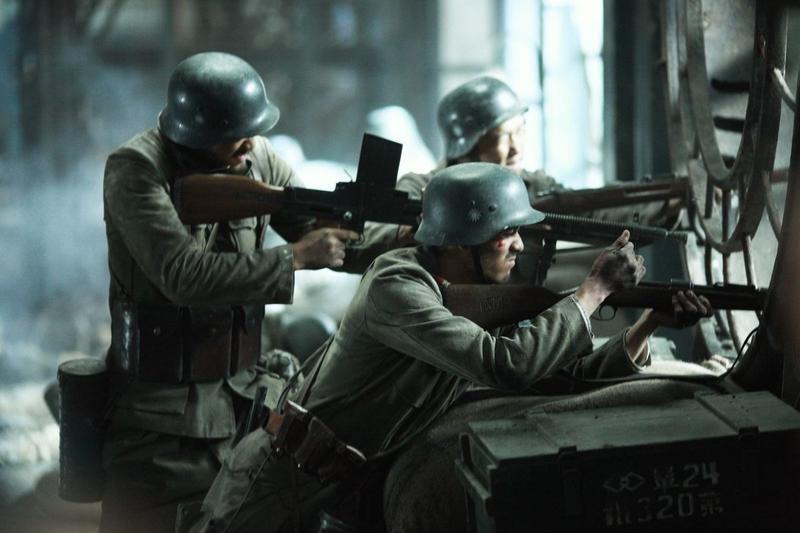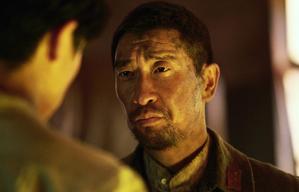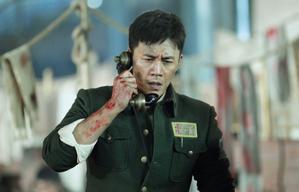 The Eight Hundred recounts the defense by Chinese soldiers of a warehouse in Shanghai in 1937 during the War of Resistance Against Japanese Aggression. (PHOTO PROVIDED TO CHINA DAILY)
The Eight Hundred recounts the defense by Chinese soldiers of a warehouse in Shanghai in 1937 during the War of Resistance Against Japanese Aggression. (PHOTO PROVIDED TO CHINA DAILY)
The first major Chinese film to be released since the country's theaters reopened just over a month ago, director Guan Hu's war epic The Eight Hundred is widely expected to boost the sluggish market in the wake of COVID-19.
As of Thursday, the 147-minute film's advanced screenings-held on Friday and Aug 17-20-earned over 210 million yuan (US$30.3 million), propelling it to the top of China's box office charts for four consecutive days, according to the film information tracking app Beacon.
Produced by Huayi Brothers Media in association with nearly 20 companies including Tencent Pictures and Alibaba Pictures, the film, with a budget of around 550 million yuan, will open in mainland cinemas on Aug 21.
Now on a tight schedule to shoot his new Korea War-set film Jin Gang Chuan in Dandong, Northeast China's Liaoning province, Guan attended a local premiere on Aug 14, while other major cast members showed up at the Beijing premiere on the same night.
Speaking about the film, which has fulfilled his decadelong dream, Guan says it represents more than merely a cinematic work, as he hopes to commemorate the heroes who fought for the Chinese people during the War of Resistance Against Japanese Aggression (1931-45).
"You will see beyond cinema with the scenes about grassroots soldiers conquering their fear of death, and how the glory of humanity comes from ordinary people in extreme situations," says Guan.
 (PHOTO PROVIDED TO CHINA DAILY)
(PHOTO PROVIDED TO CHINA DAILY)
The director, with his voice choking with emotion, says that he appreciates all the crew members and financers who supported him in overcoming difficulties and obstacles to finish his dream project."It's a supreme glory for us to finally see this project (in theaters)," he says.
A 52-year-old Beijing native, Guan got inspiration from the battlefield stories told by his father, a former soldier with the Eighth Route Army, a major force led by the Communist Party to take on the Japanese.
Set during last phase of the Battle of Shanghai in 1937, the film recounts the story of the more than 400 Chinese soldiers defending the Sihang Warehouse, a last-stand battle which boosted the morale of Chinese people amid the aftermath of the retreat of Kuomintang's major forces.
In order to mislead the Japanese enemy, Xie Jinyuan-the besieged Chinese troops' commander-lied to reporters, claiming that he had"800 soldiers" but the actual number was a little more than 400.
The story of "The Eight Hundred" has previously inspired two films, released in 1938 and 1975.
But Guan's latest adaptation has reached new heights, especially in terms of cinematic technique, thanks to the Chinese film industry's rapid development.
 (PHOTO PROVIDED TO CHINA DAILY)
(PHOTO PROVIDED TO CHINA DAILY)
Within 18 months, the crew built a replica of the warehouse, over 60 buildings, and dug a trench to introduce water from nearby Yangcheng Lake, turning it into a 200-meter-long "river", which is shown in the movie as a section of the Suzhou River. The warehouse stood on its north bank and on the other side were the foreign concessions.
Entirely filmed with state-of-the-art IMAX cameras, the first time in China, the film was shot over 230 days in a location covering an area of more than 130,000 square meters in suburban Suzhou, Jiangsu province, between September 2017 and April 2018.
Cao Yu, one of China's best film photographers known for hits such as Legend of the Demon Cat, served as director of photography and led a team of over 170 members.
"I believe The Eight Hundred is more like a poem, about a small group of people who win back Chinese dignity and confidence through their redemption and sacrifice," says Cao.
With an ensemble cast varying between established actors, such as Wang Qianyuan and Zhang Yi, to pop idols like Ou Hao, the film continues to feature director Guan's narrative style to reflect a special era through grassroots people.
 (PHOTO PROVIDED TO CHINA DAILY)
(PHOTO PROVIDED TO CHINA DAILY)
With its advanced screenings, the film has drawn around 3 million theatergoers and garnered 8.0 points out of ten on the popular review site Douban.
But a large amount of the reviews, which have recently flooded major Chinese social platforms including WeChat and Sina Weibo, were polarized.
While some users say they are deeply moved by the sacrifices of Chinese soldiers and civilians, some history buffs are not satisfied as they believe the film has some exaggerated depictions of the Sihang Warehouse battle.
Nevertheless, the film has been highly anticipated by most domestic insiders to boost the recovery of Chinese movie market.
Earlier this year, a report from Beacon estimated that Chinese cinemas might have lost around 50-billion-yuan in box office takings caused by the six-month closure and postponing of many major releases.
"After Chinese cinemas being shuttered for such a long time due to the pandemic, The Eight Hundred is like a path-explorer. We expect it will revive the market and lift the morale of all Chinese filmmakers," says director Feng Xiaogang.


